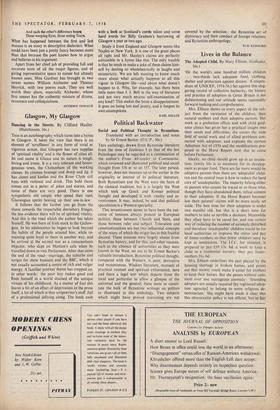Glasgow, My Glasgow
THIS is an autobiography which turns into a hymn to Glasgow. It takes the view that there is an element of 'scruffiness' in any form of vivid or vigorous action, that Glasgow has rare supplies of 'spiritual vitality' and is the flower of cities all. Its real name is Glasca and its nature is tough, loving and ironic. It is a very tolerant and homo- geneous town, the Cheltenham of the working classes. Its citizens breenge and dreep and jig, it has closes and keelies and the River Clyde still runs with violence and drink. This bold thesis comes out in a patter of jokes and stories, and some of them are very good. There is one sympathetic old couple who spend their rank Glaswegian spirits beating up their son-in-law.
It follows that the farther you go from the slums towards the respectable dormitory fringes, the less evidence there will be of spiritual vitality. And this is the road which the author has taken himself. He was born of Irish stock in the Gallow- gate. In his adolescence he began to look beyond the habits of the people around him, while re- maining quite loyal to them in another way, and he arrived at the second war as a conscientious objector, who slept on Maxton's sofa when he travelled down to visit Parliament. After that came the end of the road—marriage, the Suburbs and scripts for show business and the BBC, which is not usually accounted a centre of rich and vulgar energy. A familiar postwar theme has cropped up, in other words : the poor boy makes good and finds himself in a world drained of the antique virtues of his childhood. As a matter of fact this leaves a bit of an effect of deprivation in the prose itself, a lot of which is thin scriptwriter's stuff, full of a professional jollying along. The book ends
with a look at Scotland's comic talent and, some hard Words for Billy Graham's harrowing of Glasgow a year or two ago.
Study it from England and Glasgow seems like Naples or. New York. It is one of the great places all right and Mr. Hanky's claims are perfectly admissible in a hymn like this. The only trouble is that he tends to make a joke of these claims him- self by dealing so wholeheartedly in laughs and eccentricity. We are left wanting to know much more about what actually happens to all this vigour in Glasgow life—and about what doesn't happen to it. Why; for example, has there been little more than J. J. Bell in the way of literature and not very much serious self-examination of any kind? This makes the book a disappointment. It goes on being lost and jaunty, and it forgets its own assumptions.
KARL MILLER


































 Previous page
Previous page